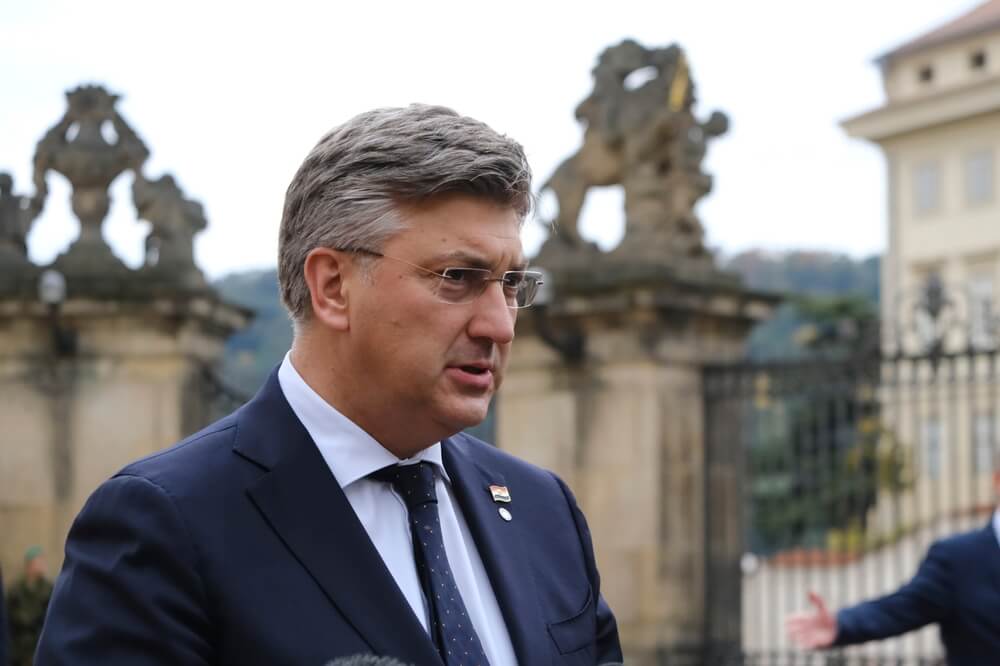Just two weeks after NATO members demonstrated their internal cohesion and dedication to common objectives at the anniversary summit in Washington, two members of the Alliance have engaged in a genuine, small-scale diplomatic conflict.
Croatia, a slightly older NATO member (since 2009), banned three high-ranking officials from neighbouring Montenegro (a NATO member since 2017) from entering the country as an epilogue to the short-lived but stormy tensions over bilateral historical issues.
Croatia declared the Speaker of the Montenegrin Parliament Andrija Mandić, Deputy Prime Minister Aleksa Bečić, and the leader of one of the parties in the ruling bloc, Milan Knežević, personae non gratae.
This is the deepest diplomatic crisis to date between the two Mediterranean neighbours, who have managed to overcome the 1990s conflict-ridden past. Back then, Montenegro, as a member of the alliance with Serbia, participated in war operations in the Croatian south, which Croatia regarded as aggression.
Over the years, particularly since Montenegro became independent in 2006 and turned to NATO and EU membership, the neighbours have resolved all mutual problems from the recent past, including the border dispute on the Adriatic.
However, following a major political shift in 2020 and the departure of the pro-Western coalition and its long-time leader Milo Djukanović after 30 years in power, Montenegro's political leadership includes parties of local Serbs who sympathise with Russia and its leader Vladimir Putin.
Politicisation of history
The three high-ranking politicians who faced entry bans into Croatia are also the leaders of this pro-Russian bloc.
"Their actions cannot in any way be considered as well-intentioned and in good neighbourly spirit, nor is it in line with Montenegro’s path towards membership in the European Union," stated the Croatian Foreign Ministry following the decision to ban the entry of Montenegrin politicians.
The immediate reason for this decision is the advocacy of the three and their parties for the Parliament of Montenegro to adopt a declaration condemning the genocide at the Jasenovac concentration camp, on the territory of present-day Croatia, during the Second World War.
The controversial declaration was adopted as a demand of the pro-Serbian and pro-Russian parties in the ruling Montenegrin coalition
Croatia believes that this politicises events that history has unequivocally condemned, unnecessarily straining current neighbourly relations.
The controversial declaration was adopted as a demand of the pro-Serbian and pro-Russian parties in the ruling Montenegrin coalition, and it aimed to create a political balance following Montenegro's earlier decision to support the UN declaration commemorating the genocide in Srebrenica in Bosnia and Herzegovina, which the Serbs reject.
Blocking EU accession?
The entry ban on three of its prominent political leaders means new problems for Montenegro as a credible member of NATO and, above all, as a candidate with the best chance of becoming the next member of the EU.
"I have the impression that it will take a lot of effort and favourable circumstances for Montenegro and Croatia to get out of this situation. This also means that Montenegro will have problems on the road to European Union membership," said Tonino Picula, a Croatian Member of the European Parliament and former head of Croatian diplomacy.
There are numerous examples from the recent past, particularly in the Balkans, where an EU member has obstructed the progress of a candidate in its neighbourhood
Although the government in Zagreb denies that, as an EU member, it would block Montenegro's EU membership, it is almost certain that obstacles will emerge from Croatia from time to time as a form of political pressure on the Montenegrin leadership.
There are numerous examples from the recent past, particularly in the Balkans, where an EU member has obstructed the progress of a candidate in its neighbourhood. Neighbouring Slovenia targeted Croatia due to an unresolved border dispute in the Adriatic.
North Macedonia was unable to initiate accession negotiations with the EU for an extended period due to opposition from neighbouring Bulgaria over disputed national identity issues.
Prevent the penetration of Russian influence
The recent diplomatic war in the Balkans has given NATO a new small hot spot it would rather avoid, as it focuses on helping Ukraine defend from Russian aggression.
However, it is certain that the Croatian government did not take a drastic diplomatic step towards neighbouring Montenegro without consulting its EU and NATO partners.
 It is certain that the Croatian government did not take a drastic diplomatic step towards neighbouring Montenegro without consulting its EU and NATO partners - PM Andrej Plenkovic
It is certain that the Croatian government did not take a drastic diplomatic step towards neighbouring Montenegro without consulting its EU and NATO partners - PM Andrej Plenkovic
The European Commission refused to intervene in this case and merely called for mutual respect between the neighbours and "avoiding unnecessary tensions"—a formulation that still points the finger at Montenegro as the source of the problem.
NATO will certainly consider this case in light of the pro-Russian political orientation of the "punished" Montenegrin politicians. The government they have been part of for four years came to power following a wave of street demonstrations led by the local Orthodox Church, which has a strong affection for Russia and its leader.
The space for new tensions is still wide open, given the ongoing significant political processes in both countries, where radical steps are always possible. Montenegro is currently undergoing government reconstruction, while Croatia is preparing for the forthcoming presidential elections by the end of the year.
However, Croatia made this decision to let its junior NATO partner know that it will not tolerate political actions that support Russian influence in the region.